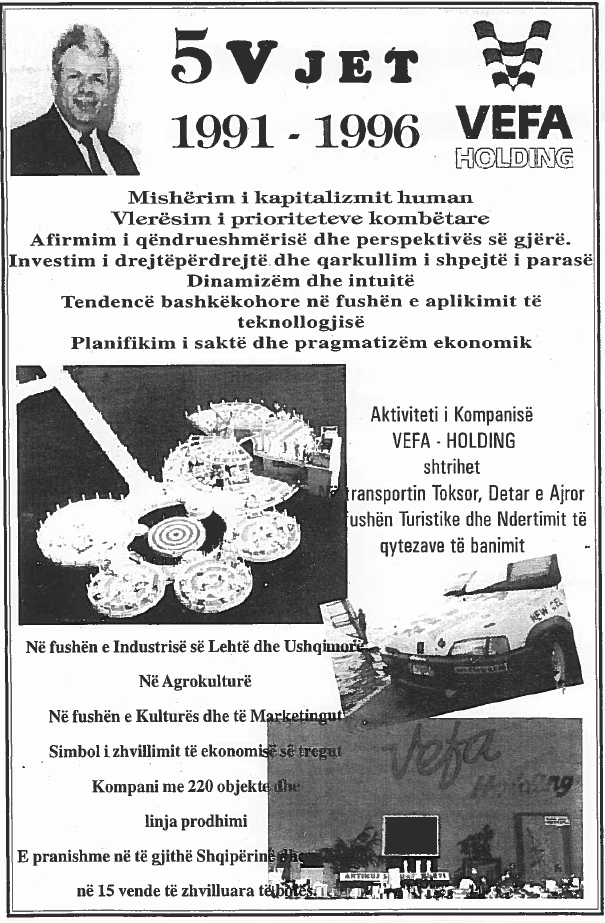
Vefa Ad on 5-year Anniversary
Vefa Holding was on the of the first firms to register as kompani (company). By 1996, the firm completed its 5th year of businesses, thus representing the firms with the longest history (other firms emerged after 1993). In 1996, Vefa celebrated its 5th year anniversary with a public fair and other festivities. In public media and events, Vefa represented itself (and was seen as such by kreditore) as a leading capitalist company engaging in multiple areas of the economy.
Throughout 1996, Vefa published 5th anniversary ad. It featured Vefa’s values:
The incarnation of humane capitalism
Valuing national priorities
Affirmation of stability and broad perspective
Direct investment in the rapid circulation of money
Dynamism and intuition
Contemporary tendency in the field of the application of technology
The accurate planning of pragmatic economics
and its multiple economic activities:
Land, sea, air transportation
National and international Tourism
Construction of housing complexes
In the light industry and food industry
Agriculture
Culture and Marketing
In the Free market
220 production lines
In chapter 1 of my book I explore this and other ads of the firms. I argue that:
Here Vefa presents itself as a capitalist enterprise, competitive yet also generous and benevolent (“humane capitalism”). Vefa’s activities are cast in line with the national project of free-market reform, highlighting its “direct investments” into the national economy and its contribution towards the development of capital markets (“the rapid circulation of money”), which refers to its fajde activity. Further the ad projects a business ethic that combines a competitive spirit and entrepreneurial instinct (“dynamism and intuition”), rational calculation, and planning (“accurate planning and pragmatic economics”). Finally, it points out connections to global business trends by emphasizing the company’s “contemporary tendency” and the incorporation of “contemporary technology.” Overall, the ad captures a historically specific register of entrepreneurship. The values of the firm represent a capitalist ethic that combines aspects of a Weberian ethic of discipline and calculation (Weber 2004 [1920]), an instinctual financial acumen not unlike that of Wall Street traders and speculators (cf. Ho 2009; Zaloom 2006; Appadurai 2005), and a patriotic economic ethos that resonates with the communist economic ethic. This entrepreneurial ethic extended beyond these firms, encompassing a postsocialist entrepreneurial ethic at large. [Excerpts from Chapter 1: Capitalist Firms of Ponzi Schemes?: Gender Notions of Finance]
References
Appadurai, Arjun. “The Ghost in the Financial Machine.” Public Culture 23 no. 3, (2005) : 517–39.
Ho, Karen. Liquidated: An Ethnography of Wall Street. Durham, NC: Duke University Press, 2009.
Weber, Max. The Protestant Ethic and the Spirit of Capitalism. Vol. 4th. Oxford: Oxford University Press, 2004.
Zaloom, Caitlin. Out of the Pits: Traders and Technology from Chicago to London. Chicago: University of Chicago Press, 2006.
